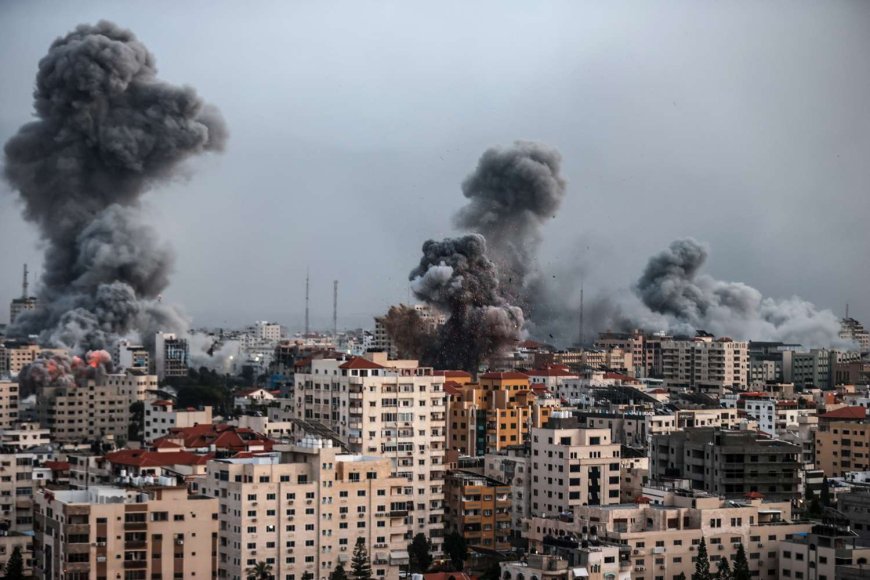Israel Escalates Strikes on Gaza City as Ceasefire Talks Remain in Deadlock
Israeli air and ground forces intensified attacks on eastern Gaza, killing at least 11 people, as ceasefire negotiations in Cairo stall despite U.S. backing.

Jerusalem/Gaza –
Tensions in the Gaza Strip surged overnight as Israeli forces intensified air and artillery strikes on eastern Gaza City, resulting in at least 11 Palestinian deaths and dozens more injured, according to local health officials. The escalation comes amid a breakdown in ceasefire negotiations, despite U.S. diplomatic pressure and renewed mediation efforts in Cairo.
The Israel Defense Forces (IDF) confirmed the overnight operation, saying it targeted “terror infrastructure and militant positions” in eastern Gaza’s Shuja’iyya and Zaytoun neighborhoods. Residents reported some of the heaviest bombardments since the conflict reignited weeks ago, with entire residential blocks reduced to rubble.
“The blasts were relentless — it felt like the ground was shaking for hours,” said Ahmed Al-Khaldi, a Gaza City resident, speaking via phone. “People are fleeing with whatever they can carry, but there is nowhere safe to go.”
Ceasefire Talks at a Standstill
Hopes for a diplomatic breakthrough dimmed as Hamas political bureau deputy Khalil Al-Hayya arrived in Cairo to meet Egyptian and Qatari mediators. The visit is part of renewed attempts to revive a U.S.-backed ceasefire framework that has been stalled for over a week.
According to Egyptian officials familiar with the talks, the main sticking points remain:
-
Duration of a ceasefire period before permanent arrangements are made.
-
Phased release of Israeli hostages held in Gaza.
-
Guarantees for lifting the blockade on Gaza and allowing humanitarian aid.
A senior Egyptian diplomat told Al Jazeera that negotiations are “difficult but not impossible” and that “all parties are under international pressure to avoid further civilian casualties.”
U.S. Push for De-escalation
The United States has intensified its diplomatic engagement, with Secretary of State Antony Blinken speaking separately to Israeli Prime Minister Benjamin Netanyahu and Egyptian President Abdel Fattah el-Sisi.
In a statement released by the State Department, Washington emphasized “the urgent need to halt hostilities and protect civilian life” while supporting Israel’s right to defend itself.
However, U.S. officials are reportedly frustrated at the slow progress, with one White House source telling The Guardian that “the talks risk becoming meaningless if the violence continues to escalate.”
Humanitarian Situation Worsens
The United Nations Office for the Coordination of Humanitarian Affairs (OCHA) warned that the conflict has pushed Gaza’s already fragile infrastructure to the brink of collapse.
-
Electricity remains cut off in most areas for over 20 hours a day.
-
Clean water supplies are scarce, forcing many residents to rely on unsafe sources.
-
Hospitals are overwhelmed with casualties, operating with dwindling medical supplies.
“Without an immediate ceasefire, the humanitarian catastrophe will deepen beyond our ability to respond,” said UN humanitarian coordinator Lynn Hastings.
Regional Repercussions
Analysts warn that the current escalation could spill over into broader regional instability. Hezbollah in Lebanon has issued fresh warnings following Israeli strikes near the southern Lebanese border. Meanwhile, protests have erupted in Jordan, Morocco, and Turkey, calling for stronger action against Israel.
Dr. Omar Rahman, a Middle East analyst at the Doha Institute, noted that the conflict is “no longer just about Gaza — it is part of a larger geopolitical struggle involving Iran, the U.S., and regional powers.”
Israel’s Military Strategy
Israeli officials argue that the intensified strikes are necessary to dismantle Hamas’s military capabilities. Defense Minister Yoav Gallant said the current phase of the operation is focused on “eliminating remaining militant strongholds and preventing the regrouping of enemy forces.”
According to the IDF, over 200 militant targets were struck in the past 48 hours, including weapons depots, tunnel networks, and command centers.
However, human rights organizations have raised concerns about the disproportionate impact on civilians, urging Israel to adhere to international humanitarian law.
Hamas Response
Hamas’s military wing, the Izz ad-Din al-Qassam Brigades, has vowed retaliation for the recent strikes. In a statement, the group accused Israel of deliberately targeting civilian areas and warned of “a response that will shock the enemy.”
Rocket fire from Gaza into southern Israel has intensified, with several projectiles intercepted by Israel’s Iron Dome defense system. The IDF confirmed that at least five rockets landed in open areas, causing no casualties.
International Reaction
The European Union’s foreign policy chief Josep Borrell expressed “deep concern” over the renewed escalation and called on all parties to return to negotiations. Russia and China have also weighed in, urging restraint and offering to mediate.
In the Arab world, the Arab League has convened an emergency session to address the crisis, with several member states pushing for a UN Security Council resolution demanding an immediate ceasefire.
Outlook: A Narrowing Window for Peace
Diplomatic experts warn that the window for a peaceful resolution is narrowing. If the violence persists, the risk of an all-out regional confrontation could rise dramatically.
“Each day without a ceasefire erodes trust, hardens positions, and makes compromise more difficult,” said Dr. Hanan Ashrawi, a veteran Palestinian politician and peace negotiator.
With international mediators running out of options, the coming days will be critical in determining whether Gaza descends further into chaos or sees the first signs of relief.
Conclusion
The current crisis in Gaza is not only a humanitarian tragedy but also a pivotal test for regional stability and international diplomacy. As Israel presses its military offensive and Hamas holds firm, the failure of ceasefire talks could have devastating long-term consequences.
The coming hours and days will likely define whether a diplomatic breakthrough is possible or whether the Middle East moves closer to another prolonged and deadly conflict.











